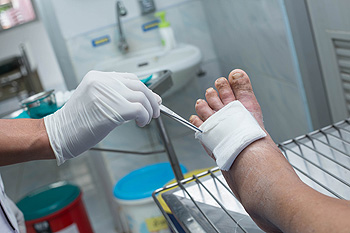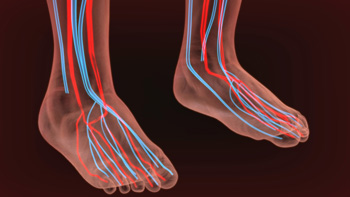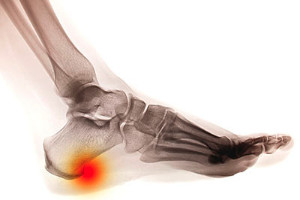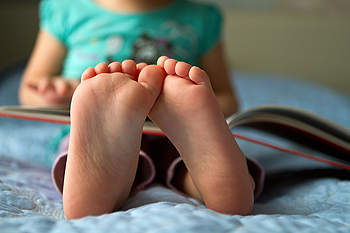
 Research has indicated there are millions of people worldwide who have diabetes. Many of these patients will develop wounds on the feet, which may lead to foot ulcers. It is important to treat these wounds promptly, as this may prevent serious foot conditions from developing. Wound healing may be accelerated when the damaged tissue is removed, and this can be accomplished from a variety of methods. When the correct dressing is applied, the wound can heal and drain properly. Many patients find it necessary to keep pressure off the foot, and this can be accomplished by wearing a boot or a removable cast walker. If you would like additional information on how to care for foot wounds, it is strongly suggested that you schedule a consultation with a podiatrist.
Research has indicated there are millions of people worldwide who have diabetes. Many of these patients will develop wounds on the feet, which may lead to foot ulcers. It is important to treat these wounds promptly, as this may prevent serious foot conditions from developing. Wound healing may be accelerated when the damaged tissue is removed, and this can be accomplished from a variety of methods. When the correct dressing is applied, the wound can heal and drain properly. Many patients find it necessary to keep pressure off the foot, and this can be accomplished by wearing a boot or a removable cast walker. If you would like additional information on how to care for foot wounds, it is strongly suggested that you schedule a consultation with a podiatrist.
Wound care is an important part in dealing with diabetes. If you have diabetes and a foot wound or would like more information about wound care for diabetics, consult with Dr. Alan J. Spector from Shore Podiatry. Our doctor will assess your condition and provide you with quality foot and ankle treatment.
What Is Wound Care?
Wound care is the practice of taking proper care of a wound. This can range from the smallest to the largest of wounds. While everyone can benefit from proper wound care, it is much more important for diabetics. Diabetics often suffer from poor blood circulation which causes wounds to heal much slower than they would in a non-diabetic.
What Is the Importance of Wound Care?
While it may not seem apparent with small ulcers on the foot, for diabetics, any size ulcer can become infected. Diabetics often also suffer from neuropathy, or nerve loss. This means they might not even feel when they have an ulcer on their foot. If the wound becomes severely infected, amputation may be necessary. Therefore, it is of the upmost importance to properly care for any and all foot wounds.
How to Care for Wounds
The best way to care for foot wounds is to prevent them. For diabetics, this means daily inspections of the feet for any signs of abnormalities or ulcers. It is also recommended to see a podiatrist several times a year for a foot inspection. If you do have an ulcer, run the wound under water to clear dirt from the wound; then apply antibiotic ointment to the wound and cover with a bandage. Bandages should be changed daily and keeping pressure off the wound is smart. It is advised to see a podiatrist, who can keep an eye on it.
If you have any questions, please feel free to contact our office located in Point Pleasant, NJ . We offer the newest diagnostic and treatment technologies for all your foot care needs.
Peripheral neuropathy is a result of dam age done to the nerves outside of the brain and spinal cord. This will often cause weakness, numbness, and pain in the feet. This type of neuropathy can result from traumatic injuries, infections, metabolic problems, inherited causes and an exposure to toxins. The symptoms include muscle weakness, a lack of coordination and falling, sharp burning pain, numbness and extreme sensitivity to touch. People who have diabetes, kidney and thyroid disorders, vitamin deficiencies and have a history of alcohol abuse are at an increased risk to acquire peripheral neuropathy. Complications that can arise are infections, burns and skin trauma and an increased propensity to falls. The risk for peripheral neuropathy can be decreased by exercising regularly, avoiding factors that may cause nerve damage and eating a diet that is rich in fruits, vegetables and protein. If you feel that you may be at risk for peripheral neuropathy, it is advised to consult with a podiatrist.
age done to the nerves outside of the brain and spinal cord. This will often cause weakness, numbness, and pain in the feet. This type of neuropathy can result from traumatic injuries, infections, metabolic problems, inherited causes and an exposure to toxins. The symptoms include muscle weakness, a lack of coordination and falling, sharp burning pain, numbness and extreme sensitivity to touch. People who have diabetes, kidney and thyroid disorders, vitamin deficiencies and have a history of alcohol abuse are at an increased risk to acquire peripheral neuropathy. Complications that can arise are infections, burns and skin trauma and an increased propensity to falls. The risk for peripheral neuropathy can be decreased by exercising regularly, avoiding factors that may cause nerve damage and eating a diet that is rich in fruits, vegetables and protein. If you feel that you may be at risk for peripheral neuropathy, it is advised to consult with a podiatrist.
Neuropathy
Neuropathy can be a potentially serious condition, especially if it is left undiagnosed. If you have any concerns that you may be experiencing nerve loss in your feet, consult with Dr. Alan J. Spector from Shore Podiatry. Our doctor will assess your condition and provide you with quality foot and ankle treatment for neuropathy.
What Is Neuropathy?
Neuropathy is a condition that leads to damage to the nerves in the body. Peripheral neuropathy, or neuropathy that affects your peripheral nervous system, usually occurs in the feet. Neuropathy can be triggered by a number of different causes. Such causes include diabetes, infections, cancers, disorders, and toxic substances.
Symptoms of Neuropathy Include:
Those with diabetes are at serious risk due to being unable to feel an ulcer on their feet. Diabetics usually also suffer from poor blood circulation. This can lead to the wound not healing, infections occurring, and the limb may have to be amputated.
Treatment
To treat neuropathy in the foot, podiatrists will first diagnose the cause of the neuropathy. Figuring out the underlying cause of the neuropathy will allow the podiatrist to prescribe the best treatment, whether it be caused by diabetes, toxic substance exposure, infection, etc. If the nerve has not died, then it’s possible that sensation may be able to return to the foot.
Pain medication may be issued for pain. Electrical nerve stimulation can be used to stimulate nerves. If the neuropathy is caused from pressure on the nerves, then surgery may be necessary.
If you have any questions, please feel free to contact our office located in Point Pleasant, NJ . We offer the newest diagnostic and treatment technologies for all your foot care needs.
 Many patients have pain in the heel area of the foot, and this may be indicative of condition that is known as a heel spur. It is considered to be a bony growth that forms underneath the heel and may be hooked or pointed. It grows toward the middle of the foot and can cause pain in the arch. The symptoms that are associated with heel spurs often include heel pain upon arising in the morning, swelling and heat coming from the affected heel, and the foot may feel achy as the day progresses. It can develop for a variety of reasons. These can consist of an injury that has occurred to the heel, participating in running and jumping activities, and wearing shoes that do not fit correctly. If you feel you may have developed a heel spur, it is advised to seek the counsel of a podiatrist who can determine what the best treatment is for you.
Many patients have pain in the heel area of the foot, and this may be indicative of condition that is known as a heel spur. It is considered to be a bony growth that forms underneath the heel and may be hooked or pointed. It grows toward the middle of the foot and can cause pain in the arch. The symptoms that are associated with heel spurs often include heel pain upon arising in the morning, swelling and heat coming from the affected heel, and the foot may feel achy as the day progresses. It can develop for a variety of reasons. These can consist of an injury that has occurred to the heel, participating in running and jumping activities, and wearing shoes that do not fit correctly. If you feel you may have developed a heel spur, it is advised to seek the counsel of a podiatrist who can determine what the best treatment is for you.
Heel spurs can be incredibly painful and sometimes may make you unable to participate in physical activities. To get medical care for your heel spurs, contact Dr. Alan J. Spector from Shore Podiatry. Our doctor will do everything possible to treat your condition.
Heels Spurs
Heel spurs are formed by calcium deposits on the back of the foot where the heel is. This can also be caused by small fragments of bone breaking off one section of the foot, attaching onto the back of the foot. Heel spurs can also be bone growth on the back of the foot and may grow in the direction of the arch of the foot.
Older individuals usually suffer from heel spurs and pain sometimes intensifies with age. One of the main condition's spurs are related to is plantar fasciitis.
Pain
The pain associated with spurs is often because of weight placed on the feet. When someone is walking, their entire weight is concentrated on the feet. Bone spurs then have the tendency to affect other bones and tissues around the foot. As the pain continues, the feet will become tender and sensitive over time.
Treatments
There are many ways to treat heel spurs. If one is suffering from heel spurs in conjunction with pain, there are several methods for healing. Medication, surgery, and herbal care are some options.
If you have any questions feel free to contact our office located in Point Pleasant, NJ . We offer the latest in diagnostic and treatment technology to meet your needs.
 The feet are comprised of numerous bones, joints, and tendons. Patients who are afflicted with arthritis in the feet may notice changes that occur in the arch. Osteoarthritis can affect the joints in the big toe, and the range of motion may become limited. Other symptoms can often include the bones becoming bigger, and a bunion may form on the outside of the big toe. Research has indicated there are several forms of inflammatory arthritis. These include reactive arthritis, gout, and psoriatic arthritis. The former typically affects the heel and ankle. Symptoms of gout often include severe pain and discomfort, and typically affects the big toe. The latter type of arthritis causes dactylitis, which is defined as pain and swelling. If you are suffering from any type of arthritis in the feet, it is suggested to schedule a consultation with a podiatrist who can properly treat this condition.
The feet are comprised of numerous bones, joints, and tendons. Patients who are afflicted with arthritis in the feet may notice changes that occur in the arch. Osteoarthritis can affect the joints in the big toe, and the range of motion may become limited. Other symptoms can often include the bones becoming bigger, and a bunion may form on the outside of the big toe. Research has indicated there are several forms of inflammatory arthritis. These include reactive arthritis, gout, and psoriatic arthritis. The former typically affects the heel and ankle. Symptoms of gout often include severe pain and discomfort, and typically affects the big toe. The latter type of arthritis causes dactylitis, which is defined as pain and swelling. If you are suffering from any type of arthritis in the feet, it is suggested to schedule a consultation with a podiatrist who can properly treat this condition.
Arthritis can be a difficult condition to live with. If you are seeking treatment, contact Dr. Alan J. Spector from Shore Podiatry. Our doctor can provide the care you need to keep you pain-free and on your feet.
Arthritic Foot Care
Arthritis is a joint disorder that involves the inflammation of different joints in your body, such as those in your feet. Arthritis is often caused by a degenerative joint disease and causes mild to severe pain in all affected areas. In addition to this, swelling and stiffness in the affected joints can also be a common symptom of arthritis.
In many cases, wearing ill-fitting shoes can worsen the effects and pain of arthritis. Wearing shoes that have a lower heel and extra room can help your feet feel more comfortable. In cases of rheumatoid arthritis, the arch in your foot may become problematic. Buying shoes with proper arch support that contour to your feet can help immensely.
Alleviating Arthritic Pain
It is best to see your doctor for the treatment that is right for your needs and symptoms. Conditions vary, and a podiatrist can help you determine the right method of care for your feet.
If you have any questions, please feel free to contact our office located in Point Pleasant, NJ . We offer the newest diagnostic tools and technology to treat your foot and ankle needs.
 Babies’ feet are considerably more flexible than the feet of adults. This is because their foot bones have not fully developed; damage to the feet can therefore occur easily to children’s feet when compared to adult feet. Research has indicated it is not necessary for young children to wear shoes while indoors. The toes will become stronger as they grasp the floor, and this will help the feet naturally develop. When shoes are eventually worn, it is helpful to measure your child's feet every three months until they are approximately three years of age. This can ensure that there is enough room in the shoes for the toes to move freely. Research has indicated that many babies are born with flat feet, and this is generally outgrown by the age of six or seven. If you notice your child is walking with their toes pointed inward or outward, it is suggested to speak to a podiatrist who can determine if this is due to any underlying foot conditions.
Babies’ feet are considerably more flexible than the feet of adults. This is because their foot bones have not fully developed; damage to the feet can therefore occur easily to children’s feet when compared to adult feet. Research has indicated it is not necessary for young children to wear shoes while indoors. The toes will become stronger as they grasp the floor, and this will help the feet naturally develop. When shoes are eventually worn, it is helpful to measure your child's feet every three months until they are approximately three years of age. This can ensure that there is enough room in the shoes for the toes to move freely. Research has indicated that many babies are born with flat feet, and this is generally outgrown by the age of six or seven. If you notice your child is walking with their toes pointed inward or outward, it is suggested to speak to a podiatrist who can determine if this is due to any underlying foot conditions.
The health of a child’s feet is vital to their overall well-being. If you have any questions regarding foot health, contact Dr. Alan J. Spector of Shore Podiatry. Our doctor can provide the care you need to keep you pain-free and on your feet.
Tips for Keeping Children's Feet Healthy
If you have any questions, please feel free to contact our office located in Point Pleasant, NJ . We offer the newest diagnostic and treatment technologies for all your foot care needs.